
Website founded by
Milan Velimirović
in 2006
19:49 UTC


| |
MatPlus.Net  Forum Forum  General General  Plachutta in 2# Plachutta in 2# |
| |
|
|
|
|
You can only view this page!
| | | (1) Posted by Hauke Reddmann [Thursday, Mar 22, 2007 16:08] | Plachutta in 2#
Do you know nice examples of the Plachutta theme in 2#?
(I even just managed to do a 180 degree Plachutta!
- Of course with a checking key. Probably this is not
needed in the standard 90 degree case.)
Hauke
| | | (2) Posted by David Knezevic [Thursday, Mar 22, 2007 17:14] |
Black or White Plachuta? Black is hardly possible in a twomover since theme requires two moves: 1) interference and 2) Decoy.
For White Plachutta a black sacrificial move is missing before the first white move - or is it?
Miroslav Stošić
original from 1973
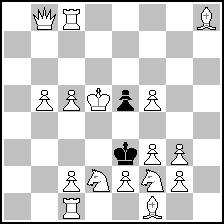 (= 16+2 ) (= 16+2 )
#2 vv |
1.Qxe5+? Kxd2 2.Qf4#, 1... Kxf2! 2.Bd4??
1.Bxe5? (~) Kxf2 2.Bd4#, 1... Kxd2! 2.Qf4??
1.fxe6(ep)! (~)
1... Kxd2 2.Qf4#
1... Kxf2 2.Bd4#
Pawn sacrifice was the last black move before the position on diagram.
This original from 1973 was reproduced in book: "Miroslav Stošić - Izabrani problemi" (1979) |
| | | (3) Posted by Hauke Reddmann [Friday, Mar 23, 2007 12:22] |
Yup, the black sacrifice was "just" in the past here -
extremely cool problem!
No, I meant black Plachutta or Holzhausen, and no, you don't need
a decoy for either: wBa8,wRb7,sRb6,sRc7,sKd5, 1...R(x)c6 2.Rb5/d7
Although the effect is rather more related to a Nowotny. I dimly remember
Brunner used that matrix. Or was it Kraemer/Zepler?
Hauke
| | | (4) Posted by Harry Fougiaxis [Friday, Mar 23, 2007 23:38]; edited by Harry Fougiaxis [07-03-23] |
Well, I had the impression that Plachutta needs a decoy, by definition. Yet, I see what you mean (although I do not personally consider it a Plachutta). You will not be surprised, I guess, that this has been done quite a few times, see the below problems that I found in the WinChloe database.
Francis J.C. de Blasio
Problem 1953 (= 10+7 ) (= 10+7 )
#2 | 1...Qxb4 2.Rxc7#
1.Se6! [2.Sa3#]
1...Qxe6 2.Rxc7#
1...Rxe6 2.Rxf4#
1...Qxb4 2.Rxb4#
1...f3 2.Se3#
It seems to be the pioneer, but I'm not a two-mover expert! |
Jacques Rotenberg
Matthieu Leschemelle
Europe Echecs 1995
 (= 6+6 ) (= 6+6 )
#2 | 1.Sb4! [2.Qb3#]
1...Rcxb4 2.Rxc3#
1...Rbxb4 2.Ra5#
1...Kxb4 2.Rxb5#
(1...Rxd4 2.Rxc3#)
The same mechanism, but in Meredith and with a flight-giving key |
Jacques Rotenberg
Belfort WCCC 1994
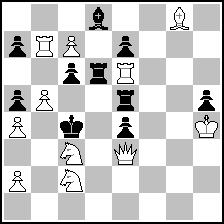 (= 11+10 ) (= 11+10 )
#2vv | 1.bxc6? [2.Sa3#] 1...Rb5/Rd4 2.Rxe4/Qxd4#, but 1...Rd3!
1.Sxe4? [2.Qb3#] 1...Rd3/Rxe4+ 2.Rxc6/Rxe4#, but 1...Rxb5!
1.Sd5! [2.Qd4#]
1...Rdxd5 2.Rxc6#
1...Rexd5 2.Rxe4#
1...Kxd5 2.Qd4#
1...c5 2.Qb3# |
Jacques Rotenberg
Jean-Marc Loustau
2 Pr Problemesis 1999-2002
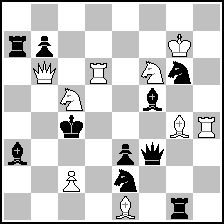 (= 9+10 ) (= 9+10 )
#2v... | 1.Scd7? [2.Qb3#] 1...Qd5 2.Bxe2#, 1...Bxc2 2.Be6#, but 1...Bxd6!
1.Se6? [2.Qb3#] 1...Bxd6 2.Qb3#, but 1...Bxc2!
1.Sd3? [2.Qb3#] 1...Bxd6 2.Sb2#, but 1...Qd5!
1.Sce4! [2.Qb3#]
1...Bxe4 2.Be6#
1...Qxe4 2.Bxe2#
1...Bxd6 2.Sxd6#
(1...Bb4 2.Qxb4#, 1...Sd4,Sc1 2.R(x)d4#)
Orthogonal setup with white correction and changed mates |
Jacques Rotenberg
4 Pr Thèmes-64 1978
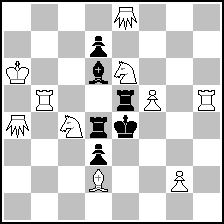 (= 10+6 ) (= 10+6 )
#2 | 1.Rd5! [2.Rxd4#]
1...Rdxd5 2.Sc5#
1...Rexd5 2.Sxd6#
1...Kxd5 2.Sb6#
1...Bc5 2.Rxe5#
The pseudo-Plachutta is in fact square-blocks by the rooks that determine which  -battery works. -battery works. |
Jacques Rotenberg
Phénix 1992
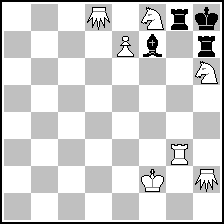 (= 7+4 ) (= 7+4 )
#2 | 1.Rg7! [2.Rxh7#]
1...Rhxg7 2.Sg6#
1...Rgxg7 2.Sxf7#
1...Kxg7 2.Sf5#
1...Bg6 2.Rxg8#
If it can be done more economically, why not?! |
WinChloe includes one more fairy example by Jérôme Auclair, published in Phénix in 1998, but I don't know how I can draw the siamese pieces! :)
| | | (5) Posted by Hauke Reddmann [Monday, Mar 26, 2007 09:57] |
THX for the examples. I hope I find the Brunner (Kraemer? Zepler)
problem so I can see what a Neudeutscher says on the matter.
The last two problems are especially interesting. Is it the same
theme, in spite of the double checks? I would say yes, since
RxS would parry if the other R on g7 would be permeable :-)
Hauke
| |
No more posts |
MatPlus.Net  Forum Forum  General General  Plachutta in 2# Plachutta in 2# |
|
|
|
 ISC 2024
ISC 2024 Forum
Forum  General
General  Plachutta in 2#
Plachutta in 2# 


